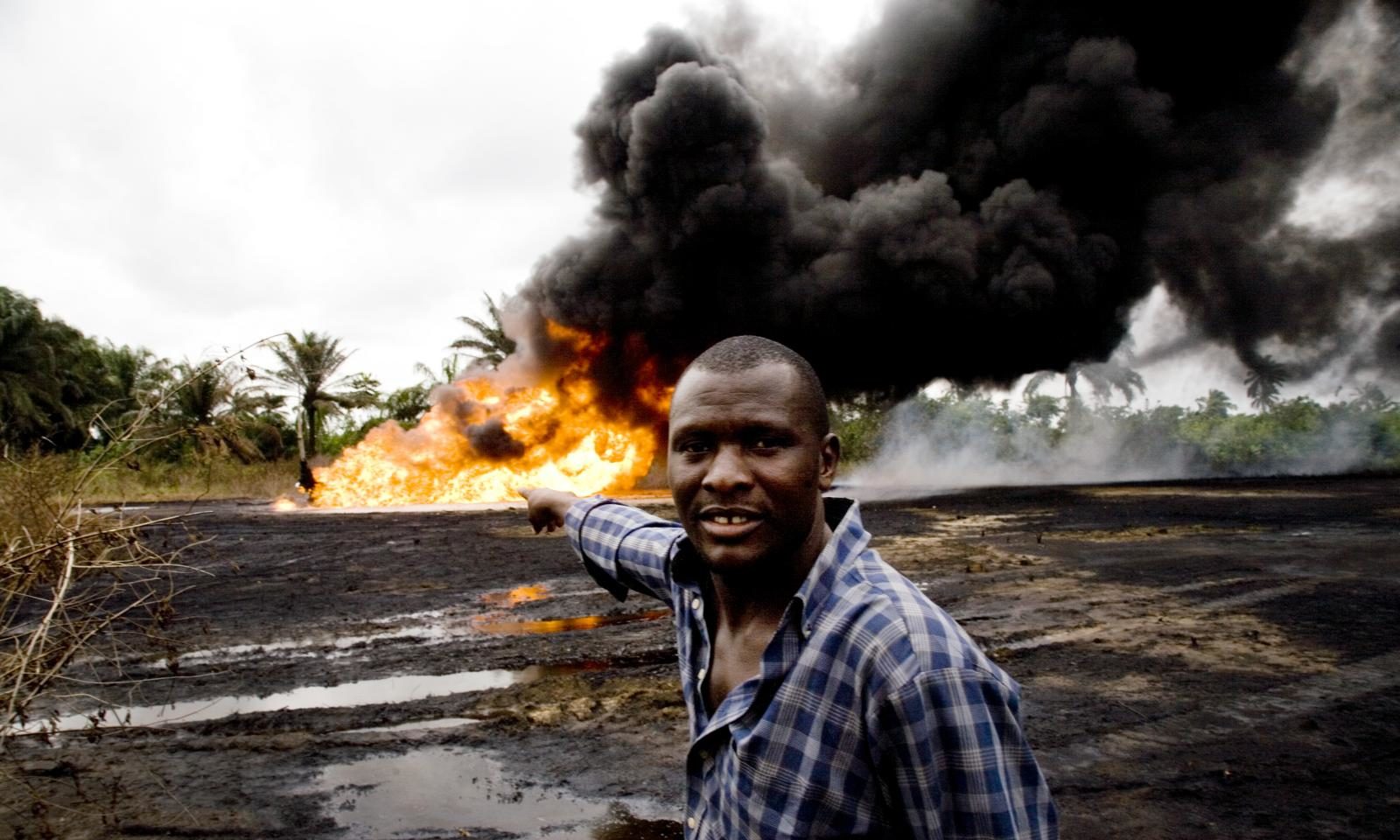Shell spills oil all over Nigeria, fails to clean it up, and tries to hide the damage…
Shell operated in Ogoniland, Nigeria from 1958 until 1993, when it finally halted production in the face of public protests led by the Ogoni people. During this time, the company was the largest oil operator in the region and was responsible for thousands of oil spills onto Ogoni lands and waterways. Even though the company pulled out in 1993, much of its equipment and infrastructure remained, continuing to contaminate the area with leaks, spills and fires for decades more. Several court cases have seen Shell forced to pay millions in compensation for the damage caused by its operations – but recent research shows that these repayments only scratch the surface of the damage Shell has done in Nigeria.
In 2011, the UN Environment Programme completed a 14-month study into the extent of oil pollution in Ogoniland. The results were shocking: the region was so polluted that it could take 30 years to clean up, costing at least a billion dollars in just the first five years.
According to the UN report, in at least 10 Ogoni communities drinking water is contaminated with hydrocarbons to a high enough level to threaten public health. The report also found:
Control and maintenance of oilfield infrastructure in Ogoniland has been and remains inadequate: the Shell Petroleum Development Company’s own procedures have not been applied, creating public health and safety issues.
The impact of oil on mangrove vegetation has been disastrous. Oil pollution in many intertidal creeks has left mangroves-nurseries for fish and natural pollution filters – denuded of leaves and stems with roots coated in a layer of bitumen-type substance sometimes one centimetre or more thick.
The five highest concentrations of Total Petroleum Hydrocarbons detected in groundwater exceed 1 million micrograms per litre (µg/l) – compared to the Nigerian standard for groundwater of 600 µg/l.
When an oil spill occurs on land, fires often break out, killing vegetation and creating a crust over the land, making remediation or revegetation difficult. At some sites, a crust of ash and tar has been in place for several decades.
The surface water throughout the creeks in and surrounding Ogoniland contain hydrocarbons. Floating layers of oil vary from thick black oil to thin sheens.
Unsurprisingly, this level of pollution has serious impacts on the physical and psychological health of the people of the Niger Delta, as well as serious consequences for plants and wildlife.
The 2011 UN study laid out a series of immediate recommendations to both Shell and the Nigerian government, urging them to get the clean-up rapidly underway. Shell claimed to be following these recommendations; however, a 2015 report by Amnesty International and the Centre for Environment, Human Rights and Development (CEHRD) found that Shell’s claims to be cleaning up its mess in line with the UN’s requirements were ‘blatantly false’.
According to Amnesty and CEHRD, four sites that the UN had identified as highly polluted were all still
‘visibly contaminated in 2015, even though Shell says it has cleaned them…The investigation demonstrates this is due to inadequate clean-up, and not new oil spills.’
According to Mark Dummett, Business and Human Rights Researcher at Amnesty International:
‘Oil spills have a devastating impact on the fields, forests and fisheries that the people of the Niger Delta depend on for their food and livelihood. Anyone who visits these spill sites can see and smell for themselves how the pollution has spread across the land.’
To make matters worse, in March 2018 a groundbreaking study co-ordinated by Amnesty and supported by thousands of volunteers accused Shell (and the Italian oil company Eni) of ‘serious negligence’ with regard to new oil pollution in Nigeria since 2011. According to the research,
‘Shell and Eni are taking weeks to respond to reports of spills and publishing misleading information about the cause and severity of spills, which may result in communities not receiving compensation.’
Between 2011 and 2018, Shell reported 1,010 spills from the pipelines and wells that it operates in Nigeria, with 110,535 barrels (or 17.5 million litres) lost into the environment. The 2018 crowdsourced Amnesty study asked volunteers ‘to review and describe all the photographs of spills published by Shell and Eni, and to highlight anything that looked unusual.’
They found at least 89 spills (46 Shell, 43 Eni) where there was significant reason to doubt the oil companies’ explanation for the spill – for example, spills which appeared to have been caused by corrosion but that the companies had labelled as theft. If true, then the communities affected by these spills have not been given the compensation they deserve. Amnesty has asked the Nigerian government to re-open investigations into all 89 of these spills.
